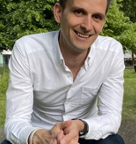How I left behind Imposter Syndrome
Last week a colleague asked me if I still had imposter syndrome. It was an interesting question that I had not thought about recently.
My answer was no.
There is a version of this that can turn into an ego-fueled “I’m amazing” post and that’s not what I intend to tell you. I want to share my experience and how I’ve moved to a different place.
I’ve had imposter syndrome in the past, including in the early years of Hillgate. However, I found that it dissipated over time. I think one reason is that as you make progress and gain experience, your perspective changes and things you once thought unreachable feel normal.
I often think of Barack Obama circa 2000. He’d just challenged a powerful incumbent Congressman and lost badly. He maxed out his credit cards to attend the DNC and he wasn’t invited to any VIP events. There’s a version of the story that ends with him leaving politics, but that’s not what happened. He possessed the same amount of talent in 2000 as he did in 2004, but things went differently. And then again in 2007–8. In a few years he went from political outcast to the most powerful man in the world. His core capabilities remained the same, but his trajectory change.
As a founder, you’re constantly facing uncertainty. You have to solve for problems you know nothing about. You start to get comfortable with this process. And as you figure out solutions, you develop a confidence in your ability to figure it out. It is a virtuous circle.
But don’t be mistaken, this process involved lots of failing as well. You just realise that failing is part of the process and doesn’t prevent you from succeeding. In fact, if you react effectively, then you can see big gains from the lessons learned in failure.
I also found that my perspective changed on who succeeds. In school, the people who succeed are often the smartest students or best athletes. The professional world is different- there are more attributes (EQ, likability, communication) that lead to success. There are still people who wow me. However, for the most part I’ve found super successful people more normal than not. This makes success feel more achievable. There’s an element of “if they can do it, then so can I”. This helps put success and accomplishment in perspective.
Additionally, the more you talk to accomplished people, the more you realise that they don’t have it all figured out. Often, they don’t know more than anyone else. They have their strengths, but they are not all-knowing Jedi masters. They understand how to exploit their strengths and find partners who shore up their weaknesses.
They also got plenty of help and some luck along the way. Think of all the artists, writers, thinkers who become influential after death. They were great at the time, but too few people knew it. The lesson for me is to believe in yourself and carry on.
I’d be remise if I didn’t mention that being a founder requires a healthy ego. You have to believe that you can solve a hard challenge that nobody else has done. And more people will doubt you then believe in you. Again, I think of Barack Obama. I don’t think his opinion of what his abilities ever change, but plenty of people doubted him. He was unproven until he was proven. That is life as a founder. If you’re going to do big things, then you better back yourself!
I do want to say that even with all this, I do have stress and anxiety. I still find myself being unsure what the right decision is or if I can figure it out.
But what I know now is that this is all part of the process. It doesn’t it make it easier to fall back asleep when i wake up stressing about something. That still sucks as much as ever. Experience helps me stress less and process it better, but it is still there.
So, to conclude, I don’t find myself facing imposter syndrome. I find myself aware of my strengths and weaknesses and taking the long view. This means that I will fail, succeed, and keep moving forward. I still get stressed and still struggle with certain decisions. I think that is just part of being human. The goal is to try and keep it in perspective and enjoy the moment. I hope this helps you do the same!
